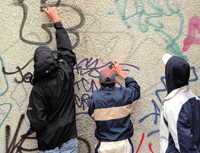
A community reparation scheme in which members of the public will be able to suggest the activities young offenders on community sentences should carry out has been launched by the Youth Justice Board (YJB) today.
Making Good will be piloted across 18 councils in the North West, with a view to rolling it out nationally in 2010.
Suggestions will be made via the YJB’s website where there will also be guidelines about what type of activities should be suggested, such as local non-profit regeneration projects.
John Drew, chief executive of the YJB, said the scheme was designed to increase public confidence in youth justice but would not put any pressure on the already over-stretched budgets of youth offending teams (YOT’s).
“People will begin to see the case for investment in youth justice if we can increase public confidence. But we still have more to do in this area. Now that custody figures are falling and reoffending figures look set to fall we can begin to focus more on the issue of public confidence.
“We believe local communities have good ideas about how to improve youth justice, and young people are less likely to reoffend after participating in reparation schemes.
“Previous successful activities have removing graffitti, clearing open spaces, refurbishing abandoned push bikes, building bird boxes and filling shelves for libraries,” Drew said.
Mike Thomas, chair of the Association of Youth Offending Team Managers said the scheme would formalise what many YOT’s were already doing.
“Reparation should pay back a community affected by youth crime in a relevant and useful way, and enable the public to understand more about youth offending teams, and how different crimes are sentenced. A lot of YOTs are already seeking input from the local community on an informal basis,” Thomas said.
Like X-Factor
However, Will McMahon, policy director at the Centre for Crime and Justice Studies, compared the policy to a “criminal justice version of the X-factor.”
“We are dealing with a group of troubling, and troubled, young people and it’s not clear that subjecting their punishment activities to a public poll via a website will benefit them.”
A YOT worker from the West Midlands agreed, stating the scheme was about “appeasing the community” and not about addressing the underlying problems behind offences.
But Joyce Moseley, chief executive of charity Catch 22 welcomed the project claiming it would build better links with communities and help people feel truly involved.
A YOT worker from Manchester agreed, adding young people “will probably enjoy knowing that they’re doing something the community is in favour of”.
Tim Bateman, senior policy advisor at crime reduction charity Nacro, said Making Good could “go either way”.
“It can be viewed as an opportunity for young people to learn skills and pay back the community, or as a punitive and demeaning activity. My concern is that some suggestions would fall into this latter category. The YJB will have to reject these suggestions from the local community, but doing so could exacerbate public misunderstandings and annoyances about the way youth justice works.”
Related articles
The Bigger Picture on Restorative Justice
Youth Justice: T2A Alliance presents white paper to government


 A trauma-informed approach to social work: practice tips
A trauma-informed approach to social work: practice tips  Problem gambling: how to recognise the warning signs
Problem gambling: how to recognise the warning signs 




 Find out how to develop your emotional resilience with our free downloadable guide
Find out how to develop your emotional resilience with our free downloadable guide  Develop your social work career with Community Care’s Careers and Training Guide
Develop your social work career with Community Care’s Careers and Training Guide  ‘Dear Sajid Javid: please end the inappropriate detention of autistic people and those with learning disabilities’
‘Dear Sajid Javid: please end the inappropriate detention of autistic people and those with learning disabilities’ Ofsted calls for power to scrutinise children’s home groups
Ofsted calls for power to scrutinise children’s home groups Seven in eight commissioners paying below ‘minimum rate for home care’
Seven in eight commissioners paying below ‘minimum rate for home care’
 Facebook
Facebook X
X LinkedIn
LinkedIn Instagram
Instagram
Comments are closed.